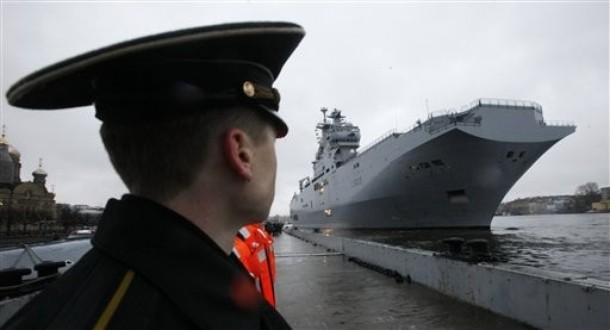
French President Nicolas Sarkozy’s US visit has carefully been protected against any fallout from his proposed sale of Mistral-class power-projection warships to Russia. Ahead of Sarkozy’s visit, Moscow moved to embarrass him. It punctured some key French assumptions about this deal and undermined French reassurances to third parties about its possible consequences.
Contrary to Paris’ declared assumptions, Moscow wants to have the Mistral-class ships fully armed, and equipped with advanced electronics. Army-General Nikolai Makarov, the Chief of the General Staff, announced on March 25 through the governmental Rossiyskaya Gazeta: “If we make a final decision on the Mistral, we will only acquire it fully equipped, with all its command and communications systems and its armaments. The only exception will be the helicopters: these will be our own. Everything else must to the full extent be made according to their [French license] standards.”
Paris had previously announced that advanced electronics and other high-technology features would not be included in the Mistral sale to Russia. The French president and government also assured NATO allies (including the United States and the Baltic States) that these warships would be sold to Russia without weapons systems (no tanks and armored personnel carriers, and Moscow had agreed to use its own helicopters aboard these ships). Some senior French officials and diplomats had maintained in Washington, at NATO Headquarters, and in the Baltic capitals, that the ships would be sold “naked” to Russia, basically as hulls.
Those assumptions and assurances were questionable from the outset, inasmuch as Mistral-class launching platforms would give Russia an unprecedented power-projection capability, even without the state-of-the-art French equipment. Makarov’s statement and the ambitions it reveals, however, undermine the case for the French sale even further.
Four Mistral-class warships are the subject of “exclusive negotiations” between France and Russia. The French president has shown himself keen to sell two ships, along with the license for two more to be built in Russia. The Russian side wants to buy one such ship from France and build three more in Russia under the French license. When Sarkozy hosted Russian President Dmitry Medvedev in Paris in early March, they agreed in principle that France would build the first ship, and Russia the third and fourth. The bargaining has come down to whether the second warship would be built by France or by both countries sharing this employment-generating project (EDM, March 9).
Stung, the French side has reacted cautiously to Makarov’s statement. The French defense ministry’s chief spokesman delicately recalled that “the president [Sarkozy] said publicly in front of his Russian counterpart what the scope for negotiations was” (Agence France Presse, March 25). That “scope” had indeed excluded the transfer of sophisticated military technologies to Russia.
Makarov’s demands notwithstanding, some key leaders in NATO and Washington persist with a laissez-faire attitude toward the Mistral issue. On March 27, in an on-the-record session of the Brussels Forum, NATO Secretary-General Anders Fogh Rasmussen reiterated his four-point position: The Mistral issue is a bilateral one between France and Russia; he personally “take[s] it for granted that Russia will not use or misuse such military equipment” against other countries; he further “take[s] it for granted that the sale will take place in accordance with all international rules and regulations;” and Russia’s status as a partner of NATO justifies confidence on those points. This was a verbatim repetition of Rasmussen’s statements in early March on the Mistral issue.
The first point implies that NATO countries are justified in making bilateral arms deals with Russia, circumventing any NATO procedures and ignoring regional security concerns. The second point inadvertently suggests that the Alliance may have started taking zero-risk scenarios for granted. The third point apparently overlooks the Mistral deal’s incompatibility with the Wasenaar arrangement on export controls for conventional arms and dual-use goods and technologies, and the European Union’s code of conduct on arms sales. The fourth point seems to see no contradiction between Russia’s status as a partner of NATO and its conduct as an overtly revisionist power in Europe.
Interviewed in the pro-presidential French daily Le Figaro on the eve of Sarkozy’s visit, US National Security Adviser General James Jones was asked whether the sale of Mistral warships to Russia could become a destabilizing factor. General Jones replied: “We ourselves are engaged in an active warming of relations with Russia. Therefore, I do not think that this deal should be of any particular concern to us. I have never raised this issue with my French counterpart, and the president [Barack Obama] has not done so either.”
The Obama administration had from the outset discouraged debate on the Mistral issue within NATO, or bilaterally with France. The US Defense Secretary Robert Gates did, nevertheless, raise significant objections with his French counterpart Herve Morin and with Sarkozy himself, during Gates’ February visit in Paris. General Jones’ interview seems to withdraw, or contradict Gates’ objections. It also appears to justify the proposed Mistral sale as being in line with US policy.
Paris has all along cited the US “reset” toward Moscow as an alibi for the possible sale of Mistral warships and other French arms sales under discussion with Russia. At this stage, such deals seem to receive, if not a green light, at least a green wink in Brussels and Washington.
Vladimir Socor is a senior fellow with the Jamestown Foundation. This essay was previously published in the Eurasia Daily Monitor as "Franco-Russian Warship Deal Receives Winks and Nods in Brussels and Washington." AP Photo.
Image: mistral-russian-navy-seaman.jpg
